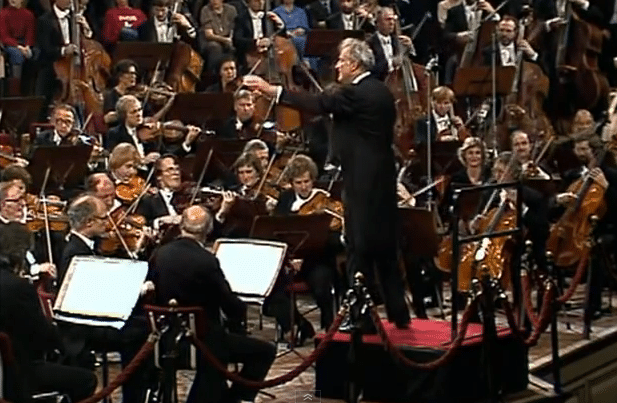Jun 8, 2015
Fall In Love With What?

The script of our upcoming public television production Fall In Love With Music asks the question: “Would you give your undivided attention to a piece of music that has no words for 15 minutes? 10 minutes? 5 minutes?” Perhaps you’ll be curious enough to watch the eighth episode next spring to find out how random individuals answer this question.
But you don’t have to wait until then to know that somewhere between 9.5 and16 million individuals (out of 318 million) in the United States would give us a resounding, unqualified “Yes!” to this question. In fact, that 3 to 5% of our population would be happy to give their undivided attention to wordless, abstract music for an hour or more!
So why on earth would someone do this? What’s in it for them? There must be some reason that the 2,700 people who were seated with me in Avery Fisher Hall last night listening to the New York Philharmonic in an all-Mozart program would indulge in this most unnatural behavior – sitting quietly, giving their undivided (for the most part!) attention to this music.
As it turns out, invisible wordless music – regardless of when it was composed – may just be the ideal medium with which to express our inner emotional life. You know, the countless inexpressible but no less intense feelings we experience every waking day and when we are sleeping. We may not have even been aware that we were feeling a certain way until we began to listen to some abstract music. Then, unencumbered by the specificity that music with words (i.e. song) entails, we suddenly realize that Mozart, or Beethoven or Rachmaninoff or your favorite composer. . .is ‘singing our song’ in a way that we never imagined possible. It feels ‘so right!’
Whether we are subjected to Beethoven’s pain or his elation, the immediacy of the experience of those invisible sound waves goes through us almost like an electrical current. And come to think of it. . .our brain and central nervous system are in fact using electrical current to process this information.
Listening to invisible, wordless music allows us to be emotionally intimate with another human being in an unparalleled fashion. Without thinking the words in our heads, we know that Beethoven understands us – and that we understand him. We know we’re not alone in the world of our complex emotions. Beethoven’s been there, too. Through the realization of his music, whether in a live concert or recorded performance, Beethoven seems very much alive and with us. And he is – through his music – even though he’s been gone for almost two hundred years!
Fall in love with what? . . .With music, of course! We will feature the fourth movement of Beethoven’s Symphony No. 7 in our final Discovery Concert of next season. So here’s a preview for you. This performance is with the late Carlos Kleiber conducting the Concertgebouw Orchestra of Amsterdam. You’ll need to move the tracking button on the screen to 1:03:10 – that’s one hour, three minutes and ten seconds into the YouTube video. If you start at the beginning you’ll get all of Beethoven’s Symphony No.4 and Symphony No. 7. . .which would be worth it, but that’s a lot more wordless, abstract music than I asked if you’d be willing to give your undivided attention to at the beginning of this blog. Starting at 1:03:10 you’ll get about seven and a half minutes of Beethoven at his manic best. Watch full screen with the sound up for maximum effect. Not sure you’ve ever felt this way? I bet you have!








